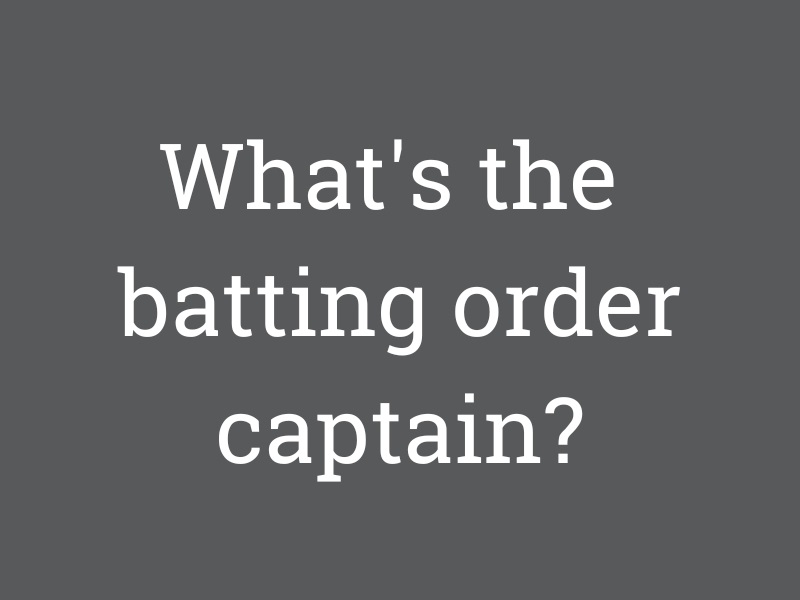When should a cricket captain share the batting order with their players and the team?
Paul Ryan | November 15, 2023

I remember a pre-season training session at Western Suburbs when I first came to Sydney and Australian cricketing great and club legend Alan Davidson spoke to the playing group about the benefits of hard work and training with purpose.
Mr. Davidson strongly emphasized the 6 Ps in cricket. Perfect Practice Prevent Piss Poor Performance.
All these years later I now know the 6Ps don’t just relate to cricket.
It’s human to want to know your role and not just in a cricket team. It’s in business, the workplace, and our personal lives. We all like to know where we fit in and the role we play.
The role of a captain in cricket is not just about what happens on the field or game day. It’s also important to know your players, what makes them tick and how you can help them feel better and more confident about the role you want them to play in the team.
A player who knows their role will tend to perform better than a player who is unsure and second-guessing their position.
In knowing your role, you can create a game plan and put the 6Ps into practice. It creates clarity and builds confidence for you to execute your skills on game day.
Sounds simple yeah.
My question is, why then when you ask a player in your club, other clubs or teams, the day or night leading into a game, where their batting in the order, they respond, “I don’t know, no idea.”
I'm surprised how often it seems to be the answer and ask, why when we as people like to know our roles does a captain deny one or all their players the opportunity to prepare accordingly?
I think it’s also important all the players in a team get to know each of their team mates roles and why they’re batting in certain positions as they too can help build the players’ confidence. In many ways, it can help take the pressure off the captain and that can’t be such a bad thing.
It’s important to be specific. Letting a batter know they’ll be opening is easy. There’s only two and they both know they’ll be walking out together.
Telling a batter, they’ll be in the middle order doesn’t help as it’s anywhere between 3 and 7 and their different roles. Suggesting the lower order is anywhere between 8 and 11 and again they're different.
Of course, things can change at any level of cricket. Injuries. Illness, work, and family commitments mean players can withdraw from games right up to the start of play. It’s life, it’s cricket and it’s our captains who bring us together to give ourselves the best opportunity to play well.
Playing Saturday to Saturday I always like to share the batting order with the players as soon as possible after the team is selected and announced.
The same thought process also applied if a team was selected a week or more before a game.
There have been circumstances where I’ve gone outside the norm and asked a player if they’d like to open the batting 15 minutes before the start of play. Some players are wired whereby they respond well to change with less thinking time.
If I can share two recent experiences.
We had a very attacking player batting 7 and 8 who hit the ball hard and long but also had a good technique defensively. After a couple of games, I thought he’d be ideal to open the batting in 50-over cricket.
I shared my thoughts with him and when I asked if he’d like to open, he ummed and ahhed and pretty much talked himself out of it. You could tell he was keen, but he thought it was more fun batting in the last 7 or 8 overs.
The following game we won the toss and batted, and I walked up to him and said you’re opening the batting today, go and have some fun.
To his credit, he just smiled, padded up and went out and scored 70 off 50 balls. We won the game, and he asked “if he could open for the rest of the season in one-day cricket.” Of course, he could.
The other experience was similar with the player umming and ahhing. I took the punt, however this time the player ran himself out without scoring and is still not happy with me. Ah well.
A captain's gut feeling is part of their role. As is communicating with their players about their roles, the batting order, how they’d like to use the bowlers and where players will be fielding. The “why” is also important.
Mr Davidson’s 6Ps would suggest all players like to know their roles well before the day or night before a game.


Having Captained teams regularly since U/12’s I think it’s very important to communicate to your team in roles everyone plays including the batting order.
Nothing worse than being a top order batsman & not knowing where you are listed in the order arriving on the day of the match.
I remember one player I Captained & he would only bat on even numbers in the order.
Luckily he was good enough to bat 4 all year…😂😂
I let the player know asap .
I plan weeks away and tell them “ be prepared to bat there , your up to it and enjoy “.
When I played for Nsw I was told on match day and I couldn’t care less , I knew from the side where I would probably bat so no issue.
I can’t recall ever being offered a night watchman. Always good to know where you are batting, and to be trusted to perform the role. T20s are different. Having a adaptable batting order in short formats can make a big difference.